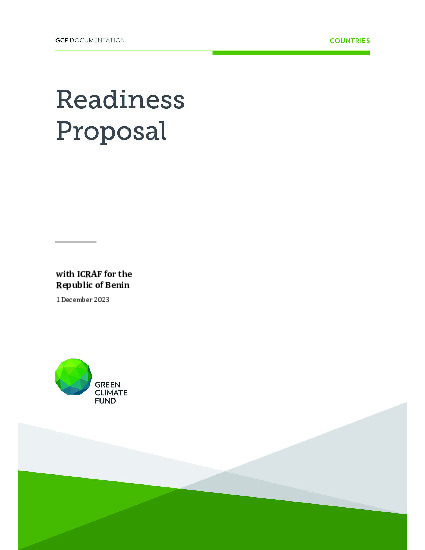Strengthening access to climate finance and integration of climate change into the local development planning in Benin

Strengthening access to climate finance and integration of climate change into the local development planning in Benin
Benin has developed important national policies and strategies documents1 which highlighted the impacts of climate change on vital agricultural and economic sectors. These impacts include the gradual rainfall deficit, the increased drought, the strong disruption on water cycle with implications on floods, violent winds, smallholder farmers’ vulnerability, recreated productivity and, the need to put in place responsive cost-effective and adaptive technologies.
Moreover, the Benin’s nationally determined contributions (NDC) was developed and being implemented under the authority of the Ministry of Living Environment and Sustainable Development (MCVDD) which plays the role of National Focal Point of the United Nations Framework Convention on Climate Change (UNFCCC). Implementing the activities envisaged under this NDC requires financial and technological means as well as capacity building. The successful implementation and operationalization of Benin’s NDC is currently faced with critical challenges including limited technical expertise, poor quality of data and information, effective and timely mobilization of national and foreign resources to support the implementation, the capacity of the involved local and national institutions to effectively integrate and manage NDC into their local planning, and the effectiveness of enforcement of the polices.
Based on these analyzes the following gaps still need to be filled to increased resilience of communities as well as for ecosystems under climate change conditions in Benin:
- The lack of climate information system (dynamic digital platform for climate information and data capitalization, the research results and data, the policy frameworks) to be capitalized from the local to the national level,
- The low level of policy on the integration of climate change into the local planning as well as the need for the integration of NDC into the CDP (communal development plan),
- The low-emission and climate-resilient development strategy LECRDS (2016- 2025) defined 12 sub-programs that need to be assessed to monitor progress made (private sectors engagement, national and international agencies, etc..) since 2016,
- The low engagement of the private sectors in the development of low-emission technologies,
- Fill the gaps in the most vulnerable municipalities not covered by the SP005 and considering important priorities of the NAP (on promoting a resilient system for the management and exploitation of natural resources and ecosystems – OS2 in agriculture and water resources sectors), NDC (needs to promoting Ecosystem based adaptation) and NCCMP (on implementing climate adaption based on sustainable ecosystem management Axe 2.1.1).
- Low level of publications of policy brief on climate change and NDC
To overcome these challenges and fill the gaps and meet the country needs, the present readiness support aims to be focused on the following outputs:
- Output 1.3.1. The Climate data repository and information sharing system in the form of digital platform developed and accessible to the public.
- Output 2.2.1. The baseline study is conducted to identify the level of integration of climate change into the local planning, to assess needs for integrating NDC into the communal development plan (CDP) and the guide developed for future generations of CDP in Benin.
- Output 2.2.2. An evaluation of the low-emission and climate-resilient development strategy (LECRDS) (2016-2025) is carried out to assess the progress made toward adequate gender sensitive decision-making in the sectoral themes targeted by the strategy.
- Output 2.4.1. Low-carbon emission technology are identified, prioritized, and assessed, the feasibility transfer analyzed and deployed, and the provision of adequate finance addressed building on country Technologies Needs Assessment and Technologies Action Plan (TNA/TAP) to boost private sector investment.
- Output 4.1.1. One (01) concept note on scaling up nature-based solutions (Ecosystem-based adaptation) developed and submitted.
- Output 5.2.1. Policy and technical brief developed, and information disseminated on integration of NDC into the local plan to create awareness for policy makers.